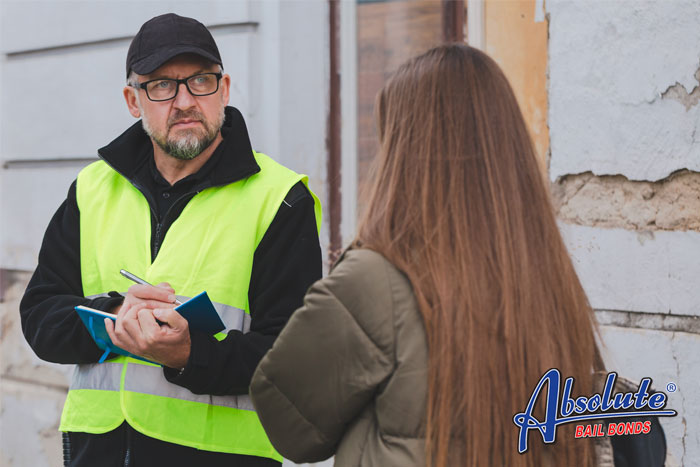
What to do When the Police Ask for Camera Footage
Over the past 10 or 15 years, cameras have become a major part of our daily lives. They’re on our phones, in our homes, built into doorbells, and even mounted on the dashboards of our cars. We usually don’t give them a second thought until the police request the footage. That’s when we suddenly start to wonder exactly what our rights are.
Can the Police Request Camera Footage Without a Warrant?
If you’re wondering if the police can ask to see the footage one of your cameras has captured even when they don’t have a warrant, the answer is yes. Where things get murkier is when you’re trying to figure out if you have to grant their request.
Do You Have to Hand Your Cameras to the Police?
If the police suspect that the camera on your phone, dashboard, or home security system contains information that pertains to a crime they’re investigating, they are allowed to take it, even if you don’t willingly hand it over. They are required to provide you with a receipt. What the police aren’t allowed to do is simply flip through the phone or watch any of the videos without permission. There are two ways they can obtain this permission. The first is if you tell them that you don’t mind. The second is by getting a warrant to inspect the camera.
The problem with camera footage is that if the police find incriminating evidence, they can use it against you.
RING Doorbells and the Police
If you have a RING doorbell, you should know that it’s possible the police may already have access to the footage the camera has captured. The brand is actively marketed to the police and some police stations have even been given the doorbells which they hand out to citizens. Amazon, who owns the company that manufactures RING doorbell does this because they are trying to cut down on delivery package thefts. It’s a good idea unless the police suspect you of a crime. Footage that is less than 60 days old and has been uploaded to a network cloud can easily fall into the police’s hands, even without your permission or a warrant.
Tony Botti, who is a Public Information Officer with the Fresno County Sheriff’s office spoke about this issue. “If we ask within 60 days of the recording and as long as it’s been uploaded to the cloud, then Ring can take it out of the cloud and send it to us legally so that we can use it as part of our investigation,” Tony said. “The consumer knows what they’re getting into. If you’re a good upstanding person who is doing things lawfully, nobody has concerns.”
When it comes to camera footage and the police, it’s in your best interest to delete any potentially damaging photos or videos that you’ve already recorded and to turn your camera off if you’re worried that it can ever be used against you during a criminal investigation.

Found a Lost Pet? Here’s What you Have to Do
It happens all the time. A dog appears in your yard or you find a cat while your out on a walk. Even though the animal isn’t yours, you invite it into your home. At this point, you find yourself in the crossroads of an ethical decision. Do you keep the lost pet or do you make an effort to track down the owners?
Protocol for Finding Lost Pets
While you might think it’s up to you to decide if you want to keep the pet or find it’s owner, California lawmakers think differently. Many lawmakers are animal lovers who have gone through the agony of having a cherished pet disappear. In an effort to help lost pets reunite with their devastated owners, the lawmakers passed legislation that requires that you report the found animal within 48 hours of finding them.
You can report the lost animal to animal control, the local police, or a local vet clinic. This gives the owner a chance to contact the same organizations as they attempt to track down the missing pet. In most cases, as soon as you contact animal control or the vet clinic, you’ll find the owner has already reported the missing animal. At that point, the only thing left for you to do is arrange for the owner to pick up their missing pet.
Don’t be surprised if you’re told that you have to bring the pet in and have it scanned for a microchip.
What Happens if you Don’t Report a Found Pet
Not reporting that you’ve found a pet within 48 hours means you’re facing a misdemeanor charge. The good news is that if you have reported the found pet and no one claims them, you are free to keep the pet.
Tips for Reuniting Found Pets with their Owners
It’s is always in your best interest to reunite a found pet with its owner. This can be a problem if it doesn’t have a microchip. The good news is that you’re not out of options. In addition to contacting the local shelters, animal control, and vet clinics about the animal, you should also post it in local social media groups. These groups are often the first place devastated owners go when they’re trying to find their missing pet.
If you’re a pet owner, it’s in your best interest to get your pet microchipped. It drastically increases the chances of you enjoying a happy reunion if the worst happens and your pet somehow escapes.

Legal Responsibilities Attached to Witnessing a Crime in California
As you were walking your dog, you witnessed a hit and run. No one was hurt, but the fleeing car did do quite a bit of property damage. Suddenly you’re in the middle of a moral dilemma. Should you report the crime or should you pretend it didn’t happen and simply go home.
While no one can tell you what you should do, you should know that if the police find out that you witnessed the hit and run, or any other type of crime, you should report the incident. There are some crimes, such as child abuse, where failing to report the situation could land you in hot legal water.
Why You Should Report the Crime
Witnessing a crime triggers a strange surge of emotions. On the one hand, you know you have a moral responsibility to tell the authorities what happened. On the other hand, you can’t stop thinking that doing so will make you some sort of tattletale, a title you worked hard to avoid while you were in grade school.
What you have to understand that telling the police about a hit and run driver, or blowing the whistle on white-collar crime is not the same thing as telling your teacher that your best friend is jumping in mud puddles and splashing water on everyone.
When it comes to crime, no matter how small the issue might be, you have a moral obligation to report it.
How Much Time do you Have to Report the Crime?
When it comes to reporting a crime, sooner is better than later. Reporting the crime right away prevents someone else from going to the police and telling that you were on the scene and have failed to report the incident. The other advantage of reporting the crime as quickly as possible is that your memory of the incident will be clear, making you a credible witness.
What Happens if You Don’t Report a Crime?
There are some crimes, particularly those that involve children, that you’re legally required to report. Failing to report a crime that involves a child comes with serious legal ramifications. If you know a child is being abused or neglected you are required to report the crime to a child welfare professional or a police officer. You have to report the situation within 36 hours of witnessing the event.
The maximum penalty for failing to report a child is a $1,000 fine and a six-month jail sentence.

Unwritten Camping Rules to Remember
Camping is wonderful. Camping provides you with the means to connect to the earth and nature while also bonding with family and friends. The best thing about camping is all the great memories you collect during each camping trip.
The next time you’re about to hit the woods for an epic camping trip, keep these unwritten camping rules in mind.
Leave Your Site Better than you Found It
It doesn’t matter if you’re a slob at home when you’re camping, you need to turn into a neat freak. Commit yourself to keeping each place you pitch your camp cleaner than when you found it. Not only does this ensure that the next set of campers who come along will also have a nice place to set up camp, but it also proves that you are environmentally aware.
Keeping the campsites cleaner than how you found it includes cleaning up after your pets.
Don’t Leave the Fire Burning
California has had more than its fair share of fires. The last thing you want is to be the cause of the next wildfire. Making sure you douse the fire whenever you’re not sitting in front of is important. It’s a good idea to throw some water over the fire pit so that there’s no risk of a stray spark setting off a big blaze.
When you’re camping, take a little while to study your campsite. If the area is full of dry leaves, underbrush, and grass, hold off on starting a fire. If a spark jumps out of your fire pit and sets some of the dry matter on fire, the entire campsite will go up in flames before you have time to spring into action.
The Camp Bathroom isn’t your Kitchen
A surprising number of people who use campgrounds treat the campground’s bathroom like it’s their kitchen. They actually use the sink to wash their dishes. If you’ve never done this, great! If you have, make sure you don’t do it again. Not only is the practice a health hazard, but it can also play havoc on the campgrounds plumbing system and it’s rude to other guests.
Be Respectful While Camping
You’re on a great camping experience and want to have a good time, but that doesn’t mean you should leave your good manners at home. If you’re using a campground, you need to be respectful.
That includes things like:
- Not walking across someone else’s campsite
- Staying calm and quiet during the night
- Using low lights
- Keeping your pets and your kids under control
Following these simple unwritten rules of camping will increase the amount of enjoyment you get on your next camping adventure.

California’s Regulations Regarding Car Seats
All parents know that infants should be contained in a car seat, however not all parents know what California’s laws are regarding car seats.
Infants and Car Seats
Any child that is two or under must be confined to a rear-facing car seat while they are in a vehicle. Failing to have your child properly secured in a car seat will result in a $500 fine and a point getting added to your driving record. Don’t assume that just because your child has passed their second birthday that it’s time to change their car seat. The law also states that the child needs to be at least 40 inches tall and or weigh at least 40 pounds before they graduate to a different type of car seat.
Car Seat for Children who are Between the Ages of 2 and 8
If your child has already celebrated their second birthday and also meets the height and weight requirements, you’re allowed to replace their rear-facing car seat for a front-facing model. California lawmakers won’t prevent you from making this transition, but they do want you to understand that the rear-facing car seats are considered 500% safer than the front-facing models.
The car seat should always be secured in the back seat unless there is a reason the back seat is considered unsafe or isn’t designed in a way that allows the car seat to be safely installed in space.
Transitioning from Car Seat to Booster Seat
There is no set age when your child can officially move out of their car seat and into a booster seat. California’s child car seat laws state that the transition can happen once your child has reached a height or weight that exceeds the limits of your front-facing car seat. In most cases, the child will be about 65 pounds. There are no requirements about the type of booster seat your child uses, though it does have to be a seat that can be safely installed in the car.
Your child is allowed to move out of the booster seat when they turn 8 or when they reach a height of 4’9”.
Make Sure the Car Seat is Properly Installed
An improperly installed car seat is nearly as dangerous as driving around without your child in a car seat. Don’t assume that you know what you’re doing. Whenever you get a new car seat or a new car, it’s in your best interest to take the entire setup to your nearest police station. One of the officers will happily examine the car seat and make sure it’s properly installed.
Rather than moving the car seat from one car to another, you should keep a car seat in each vehicle. Not taking the seat in and out of different vehicles not only extends the life of the car seat but also reduces the risk of it not getting installed properly.
You owe it to your child to stay abreast of the latest California laws pertaining to car seats.

Will the Police Cite me for Not Wearing a Face Mask?
Covid-19 has brought about many changes. One of the newest additions to our lives is the wearing of face masks while in public.
Why are Face Masks Required in California
The hope is that wearing masks will slow the spread of the Covid-19 virus. The idea is that the masks keep the droplets contained to a single person. California lawmakers are urging residents to wear a mask whenever they’re shopping.
The problem is that there is conflicting information regarding the effectiveness of face masks. The result of the conflict is that while some people happily wear a mask each time they go out, others refuse to wear them.
The debate over wearing a masks has led many people to wonder if the police will issue citations to those who don’t wear a mask while shopping.
When are Face Masks Required
According to the State of California, masks should be worn whenever:
- You’re in an indoor public area
- You’re obtaining medical services, such as dental appointments and donating blood
- You’re using some form of public transportation, in a taxi, or utilizing a rideshare program
- When you’re in an area that is heavily used by multiple people
- Interacting directly with people
Many California cities and counties have created additional laws that pertain to face masks.
Will the Police Cite you for Not Wearing a Mask While Shopping
People who are good about wearing a mask whenever they’re out and about don’t worry about police citations while they’re shopping. Those who don’t can’t stop wondering if they can issue a ticket for failing to cover the face. There were some counties that took a much firmer stance. Not only did they tell their local officers that they should issue citations to anyone who wasn’t wearing a mask, but they also attached a fine to the citation. Riverside County was one such place that decided that failing to wear a mask while shopping could result in a $1,000 fine.
The sheer number of people who were neglecting to wear a mask while shopping combined with reports of people getting verbally attacked when they asked someone to put a mask on has resulted in Governor Gavin Newsom has tightened up on the issue of masks.
He recently issued this statement.
“Simply put, we are seeing too many people with faces uncovered — putting at risk the real progress we have made in fighting the disease. California’s strategy to restart the economy and get people back to work will only be successful if people act safely and follow health recommendations. That means wearing a face covering, washing your hands, and practicing physical distancing.”-Los Angeles Times
Newson’s recent changes. At this point, it’s likely that the police won’t hand out many citations to those who fail to wear a mask while shopping, they feel that their services are needed elsewhere. That could change if the daily number of new COVID-19 cases starts to rapidly increase.

Strange Laws from California
When people think about laws, they often think about sensible rules that make sense. However, it is important to remember that laws are made by people, and this means that some real nonsense can be made into actual laws that govern the people. This is true of every country, state, and city. California is no exception.
The Golden State is home to its own bits of weirdness thanks to some odd laws. Many of these laws were created long ago, and as such, show their age. Others are a little more recent, and while it may be possible to see what the lawmaker was going for, the wording of the law isn’t quite right.
Why Are These Even Laws?
California became a state on September 9, 1850. Over the last 170 year period, a lot of laws have been enacted and removed across the state’s 160,000 square miles. Some of the laws have made sense, such as don’t steal from people and don’t kill each other. Others are a bit stranger. Some of the weirder laws that are still technically active in California include:
- A person can only wear cowboy boots in Blythe if they own two or more cows.
- A person cannot wash someone else’s car without the owner’s permission in Los Angeles.
- Cursing on a golf course in Long Beach is illegal.
- Detonating a nuclear device in Chico will result in a $500 fine.
- Flying a kite higher than 10 feet is illegal in the city of Walnut.
- Garages in San Francisco are meant for storing personal vehicles and nothing else.
- In California, it is illegal for women to drive cars while wearing housecoats.
- In San Francisco, ugly people are not allowed to walk down the street.
- It is illegal to drive in reverse in Glendale.
- It is illegal to pour salt on Hermosa Beach streets.
- Men and boys are not allowed to dress as women in Walnut unless it is for a play, or they receive a permit from the sheriff.
- Peacocks always have the right of way in Arcadia.
- San Diego homeowners can be fined $250 for having their Christmas lights up after February 2nd.
- Vehicles without drivers cannot drive over 60 mph.
- Visitors of Fresno city parks are prohibited from bothering lizards.
- Women may not wear high heels in Carmel city limits.
What Are the Penalties?
With how easily broken some of these laws can be, some people may wonder what would happen to them if they did break any of these laws. Luckily, the enforceable laws are pretty unknown by most law enforcement agents. Even if they do know about these laws, no one in their right mind would fault someone for breaking these laws.
The only law on the above list that will result in penalties, and rightfully so, is detonating a nuclear device within Chico city limits. However, the consequences for doing so will probably be more than just a $500 fine. The person will have to pay $501, at least.
These Laws Are Still in the Books
What seems to happen with a lot of these odd laws, is that they just get laughed at and forgotten. No one in this day and age is going to fine someone for wearing cowboy boots when they don’t own a cow, or arrest a woman for wearing high heels. Most of these laws are so outlandish that a person has nothing to worry about. These laws serve only as jokes at this point.

What Is Money Laundering and Why Is It Illegal?
Everyone is aware of the obvious fact that committing crimes is illegal. What can often get people into trouble is not knowing which acts are considered illegal in the first place. This leads to people doing something they thought was okay and then winding up in trouble with the law.
For instance, people are aware that stealing money from someone else is bad. However, many people do not realize that just depositing illegally gained money into a bank account is illegal. While it sounds a little, silly, there is a good reason for this.
The Definition of Money Laundering
The act of depositing illegally gotten money into a bank account, or any other legitimate institution, is called money laundering. This is a reference to how the person depositing the dirty money, because it was obtained from criminal activity, is trying to “clean” it by putting it to use in legitimate institutions such as banks and other businesses.
This crime is made illegal under 2 California laws: Penal Code (PC) 186.10 and Health and Safety Code (HS) 11370.9. The reason for the two different laws is the distinction between how the money was obtained. HS 11370.9 is only concerned with money that was obtained through all drug crimes. PC 186.10 covers money from any other type of crime.
Both of these crimes require specific intent or knowledge of criminal activity. In other words, money laundering can only occur when a person is knowingly trying to “clean” the money by placing it into a financial institution.
Why Is Money Laundering Illegal
After learning what money laundering is, some people are left wondering why the act is even illegal. Why punish someone for depositing illegally obtained money? Shouldn’t the illegal act be punishment enough?
For California, money laundering became illegal to help combat organized crime rings. In these crime rings, the lower-ranking people were the ones who would commit the illegal activity and therefore they were the ones who faced the consequences. Meanwhile, the bosses were able to get away with the money and without any consequences.
Making it illegal to handle criminally obtained money made it possible to go after the bosses of criminal organizations.
Penalties for Money Laundering
Money laundering is a wobbler offense under both PC 186.10 and HS 11370.9, meaning it can be charged as either a misdemeanor or a felony. How exactly it is charged will be dependent on the person’s criminal record and the crime itself.
When either crime is charged as a misdemeanor, the person will face:
- Up to 1 year in county jail.
- A max fine of $1,000.
When PC 186.10 is charged as a felony, a person will face:
- 16 months, 2 years, or 3 years in county jail.
- A max fine of either $250,000 or twice the amount of the money that was laundered, whichever is greater.
The maximum fine for this crime can increase if this is not the first time the person was convicted of money laundering. Also, the maximum prison sentence can increase if the total amount of money laundered was greater than $50,000.
When HS 11370.9 is charged as a felony, a person will face:
- 2, 3, or 4 years in state prison.
- A max fine of either $250,000 or twice the amount of the money that was laundered, whichever is greater.
It’s an Odd but Important Crime
Money laundering is a bit of an odd crime. For starters, it doesn’t involve laundry in any way. Then there is the fact that people are being punished for putting money into a bank account. However, as strange as this may seem, it does make sense. Making this simple act illegal allows law enforcement agents to go after those in charge of different crime organizations. This way, everyone in the criminal organization can get punished, not just those doing the grunt work.

Laws That Minors Can Break but Adults Cannot
Everyone knows what crimes are and what would happen if they were to commit one. This is just something that people learn over time. However, there is something about laws and crimes that people know, without ever really considering. What a lot of adults may not consider, is that there are somethings they can do without fear of breaking a law, while a minor would face legal trouble for doing the same.
What Are Status Offenses?
According to the law, there are plenty of things out there that adults can do, but minors cannot. This leads to an interesting section of the law where things are considered illegal, but only for minors. This means these acts can’t be crimes, because adults can do them pretty much any time they want. This is why the term status offense exists.
A status offense is any activity that a minor could get in trouble for doing simply because of their age at the time of the act. It is estimated that 20% of all juvenile arrests are due to status offenses.
Some of the most common status offenses that a minor can be charged with include:
- Being uncontrollable by parents or guardians.
- Consuming alcohol.
- Consuming marijuana.
- Consuming tobacco.
- Possessing alcohol.
- Possessing marijuana.
- Possessing tobacco.
- Running away.
- Skipping school.
- Violating curfew.
It is easy to see how these kinds of things affect minors, but aren’t a big deal for adults. Most adults don’t have to worry about skipping school or following their parents’ rules anymore.
Why Status Offenses Are a Big Deal
When people began to look closer at status offenses, they noticed the alarming trend that minors who committed status offenses were more likely to commit more delinquent acts in the future. This has led to many states, including California, to adopt programs and strategies aimed at achieving the following:
- Preserving families.
- Ensuring public safety.
- Preventing young people from becoming delinquents.
This is one of the many reasons why, when minors get into trouble they receive lighter penalties. The goal of punishing a minor after committing a crime is to teach them that their behavior was wrong and that they don’t want to commit that type of behavior again.
Penalties for Status Offenses
The penalties that a minor will face for a status defense can vary greatly depending on the minor’s record and the status offense they are being charged with. Some of the common penalties that a minor will face for a status offense include:
- Being required to attend an educational program.
- Being required to attend counseling.
- Having their driver’s license suspended.
- Paying a fine.
- Paying restitutions for any damages.
- Removing the minor from the care of the minor’s parent or guardian.
This is just a small sample of what a minor can face when charged with a status offense, and some of these consequences are more common than others.
Minors Need Different Rules
It’s a bit of an odd thought to realize that minors can get into trouble for doing things that some adults do daily without having to worry about breaking a law. However, many of these status offenses make sense. Kids should be in school, furthering their education so that they have a better chance once they reach adulthood. It wouldn’t make sense for many of these things to be made into crimes for everyone, which is why they are status offenses that only apply to minors.


